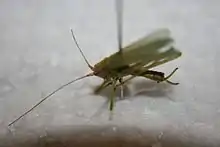| Slender meadow katydid | |
|---|---|
 | |
| Scientific classification | |
| Domain: | Eukaryota |
| Kingdom: | Animalia |
| Phylum: | Arthropoda |
| Class: | Insecta |
| Order: | Orthoptera |
| Suborder: | Ensifera |
| Family: | Tettigoniidae |
| Genus: | Conocephalus |
| Subgenus: | Anisoptera |
| Species: | C. fasciatus |
| Binomial name | |
| Conocephalus fasciatus (De Geer, 1773) | |
Conocephalus fasciatus, the slender meadow katydid, is a species of katydid of the family Tettigoniidae that is native to the United States and Canada.[1]
Habitat
Conocephalus fasciatus is commonly found year-round throughout the United States and in the southern parts of Canada.[1] They are commonly found in grassy and weedy areas in a large range of habitats including pastures, open pine woods and roadsides.[2]
Diet
The diet of C. fasciatus mainly consists of grasses and grass seedheads, which are readily available in their habitats.[3]
Identification
It is a small, slender katydid with long, narrow wings that extend beyond its posterior.[4] On average, C. fasciatus are 18–26 mm in length[2] and are usually a combination of brown and green in color.[4] In males, the cerci are green and have a stout tooth on the inner border as well as a tip that is weakly flattened. They have a straight ovipositor that is two-thirds the length of the hind femur. The Slender Meadow Katydid has a soft song that is a sequence of alternating ticks and buzzes that vary in duration from 1–20 seconds.[2]
References
- 1 2 "Slender Meadow Katydid - Conocephalus fasciatus - Details - Encyclopedia of Life". Encyclopedia of Life. Retrieved 2017-04-24.
- 1 2 3 Capinera, John; Scott, Ralph; Walker, Thomas (2004). Field guide to grasshoppers, katydids, and crickets of the United States. Ithaca, NY: Cornell University Press. pp. 181–182.
- ↑ Capinera, J. L.; Scherer, C. W.; Simkins, J. B. (1997-01-01). "Habitat Associations of Grasshoppers at the Macarthur Agro-Ecology Research Center, Lake Placid, Florida". The Florida Entomologist. 80 (2): 253–261. doi:10.2307/3495558. JSTOR 3495558.
- 1 2 "Slender Meadow Katydid". Songs of Insects. 2013-10-22. Retrieved 2017-04-24.